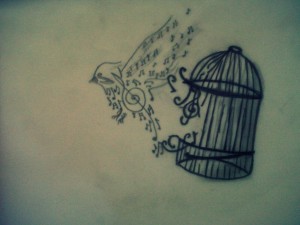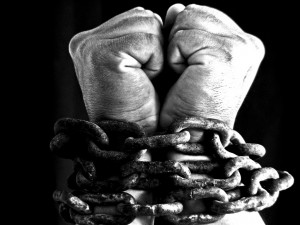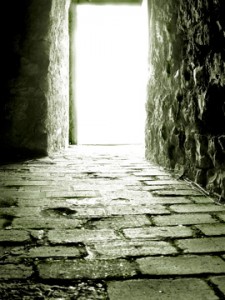
A brother who has left the monastery, either through his faults or by expulsion, and wishes to return must first promise the complete amending of the fault.
Can we welcome back?
I am taking a short break from Riding Lights Summer Theatre School to write this post. Our theme at the summer school this year is ‘Peace: Make It or Break It’ and I want to write a bit more about ‘reconciliation’ in the light of ‘peace’.
In this week’s chapter, St. Benedict challenges us with even more radical hospitality and grace towards those that cause conflict and division. His compassion and grace is matched by a firm resolve to remain committed to those that hurt and upset him and he calls us to do the same. This resolve to welcome back a previously unrepentant monk is granting that brother the chance to experience grace and forgiveness.
I have written, in the past, on the social tool, ‘Open Space Technology’. This means of discussion has several principles to facilitate multiple creative conversations to occur and to be united together by a common goal or desire. There is also one ‘law’: the law of mobility that suggests that if a participant is not learning or contributing in a particular conversation they should leave and move else where,
In this way, all participants are given both the right and the responsibility to maximize their own learning and contribution, which the Law assumes only they, themselves, can ultimately judge and control. When participants lose interest and get bored in a breakout session, or accomplish and share all that they can, the charge is to move on, the “polite” thing to do is going off to do something else.
I had real difficulty with this aspect of Open Space Technology but I have come to realize, through experience, that it is not about self-autonomy but about the necessity for us to step out of the heat of relationship before it breaks irrecoverably, to gather some perspective, to admit weakness both on the part of ourselves and the others involved and to make a decision as to where to go next. We all are autonomous to a greater or lesser degree; God has given us free will to use, to choose what we do and where we go. Some people will abuse that freedom and cause harm to others or demand their choice is held in higher esteem than others but it is in that freedom we are advised to discover the beauty of real relationship; with God and with others.
Phalim McDermott, Artistic Director of Improbable and an Open Space practitioner, once talked with me about this law and said there’s a reason it is sometimes called the law of two feet (even if those feet are only metaphorical). The first foot is used to retreat from a place, to propel you out. The second is the more important foot for it is used to send you to the next place. That place could be back into the group you left, to repent, to turn back or it could be to go somewhere new. I once noted,
What the law of two feet does do is enable the whole to function and feed itself. The parts need to be attuned to where the information may need to be passed to in order to grow and develop and create. When this happens then the second foot is an important engagement of the individual with the whole. It is not clear, however, if this indeed is how it is used.
In order for community to function it requires the parts to freely choose to participate in the whole. This commitment will require a handing over of a certain amount of autonomy for the ‘common good’. It mustn’t, however, lose all traces of freedom of choice as that free element contains the free choice to commit and to love. Communities are healthy when they hold that tension between the individual choice and the relational imperative. St. Benedict has balanced this to give space for people to be removed without a door being locked to them.
The three strikes aspect maintains the need for the community to be protected so one person’s will is not encouraged and fed so they take the power on themselves completely; for relationships that are based around only one person’s desires are abusive and unbalanced. This aspect of St. Benedict’s Rule, I feel, allows the gracious hospitality of reconciliation without compromising the strong encouragement to challenge our selfish tendencies as fallen humanity. It is radical in that it challenges while, at the same time, welcomes.
Reflection
After a breakdown of relationship how do we give space to the possibility of reconciliation? Do we really hope and pray for such healing to happen? I can talk for ages on my desire to be reconciled to someone who has hurt me but do I actively give space and time for that to happen? It’s far easier to cut the ties with them and move on. To seek healing means to allow mess to exist close by and our lives to be impacted by it. The real path to reconciliation and peace is working hard at entering into painful and difficult spaces to take the battering of relationship breakdown holding onto hope. We, as Christians, enter into conflict with our sights fixed on the end promise that all things will be re-bound together through Christ who is the source of all things and the goal of all things.
He is the image of the invisible God, the firstborn of all creation; for in him all things in heaven and on earth were created, things visible and invisible, whether thrones or dominions or rulers or powers—all things have been created through him and for him. He himself is before all things, and in him all things hold together. He is the head of the body, the church; he is the beginning, the firstborn from the dead, so that he might come to have first place in everything. For in him all the fullness of God was pleased to dwell, and through him God was pleased to reconcile to himself all things, whether on earth or in heaven, by making peace through the blood of his cross.
And you who were once estranged and hostile in mind, doing evil deeds, he has now reconciled in his fleshly body through death, so as to present you holy and blameless and irreproachable before him— provided that you continue securely established and steadfast in the faith, without shifting from the hope promised by the gospel that you heard. (Colossians 1:15-23)
From now on, therefore, we regard no one from a human point of view; even though we once knew Christ from a human point of view, we know him no longer in that way. So if anyone is in Christ, there is a new creation: everything old has passed away; see, everything has become new! All this is from God, who reconciled us to himself through Christ, and has given us the ministry of reconciliation; that is, in Christ God was reconciling the world to himself, not counting their trespasses against them, and entrusting the message of reconciliation to us. So we are ambassadors for Christ, since God is making his appeal through us; we entreat you on behalf of Christ, be reconciled to God.(2 Corinthians 5:16-20)
Loving Father, I thank you for your grace that despite my many failings and stepping away from you you always welcome me home. The door is open. You do not force your will on us but call us to accept the task you desire. Transform my heart to be more like yours, flexible and open yet steadfast in love. Teach me to reconcile and to participate in your ministry of bringing all things together for good.
Come, Lord Jesus




 Where he came from, neither of them knew. How he got past their captors; who could say? He was either a fraud, one of the warders provoking them for his own amusement; or their captors had fled leaving the cell unguarded; or it was a miracle. None of this mattered much as he walked over to them and spoke.
Where he came from, neither of them knew. How he got past their captors; who could say? He was either a fraud, one of the warders provoking them for his own amusement; or their captors had fled leaving the cell unguarded; or it was a miracle. None of this mattered much as he walked over to them and spoke. Through the doors they saw their guards sleeping soundly. It seemed so strange – no – illogical that they could slumber during a rescue mission in the jail they were meant to watch. The whole incident was feeling so mysterious and implausible; a dream with no reason. Yet this man kept leading them down the corridor towards a bright light; the final exit to freedom.
Through the doors they saw their guards sleeping soundly. It seemed so strange – no – illogical that they could slumber during a rescue mission in the jail they were meant to watch. The whole incident was feeling so mysterious and implausible; a dream with no reason. Yet this man kept leading them down the corridor towards a bright light; the final exit to freedom.